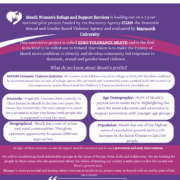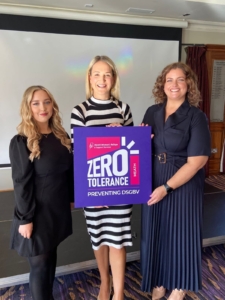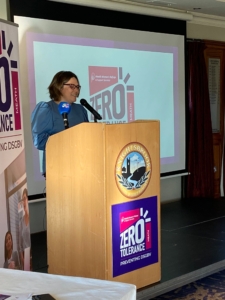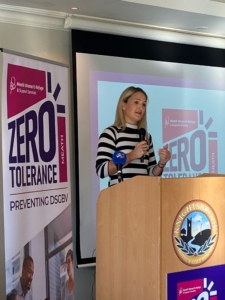Zero Tolerance Meath: A Community-Led Initiative to Combat Domestic, Sexual, and Gender-Based Violence
PRESS RELEASE – 14th October 2024
Zero Tolerance Meath: A Community-Led Initiative to Combat Domestic, Sexual, and Gender-Based Violence
Minister for Justice Helen McEntee has launched a new pilot project, Zero Tolerance Meath on October 14th, which is setting a standard in preventing Domestic, Sexual, and Gender-Based Violence (DSGBV) in County Meath.
Over the next three years, this project will use a community-led approach to prevent and respond to DSGBV, hoping to create a safer community for all women and girls. The project is led by Meath Women’s Refuge and Support Services, with funding from CUAN, and is being evaluated by Maynooth University.
The Zero Tolerance Meath project follows the principles listed in Ireland’s Third National Strategy on DSGBV, which highlights that prevention is a shared responsibility and to prevent it everyone needs to be involved. This project focuses on social change at all levels—individual, community, and institutional—by shifting values, cultural norms, and priorities surrounding gender-based violence.
The ultimate objective and goal are to create a culture of Zero Tolerance towards DSGBV, starting in Meath, with a model that could be adopted across the country.
Speaking at the launch in the Knightsbrook Hotel, Trim, on Monday, the Minister said:
‘’I commend and thank Meath Women’s Refuge and Support Services for their tireless efforts in supporting domestic abuse survivors. I am proud to support this community pilot project which represents an innovative and collaborative approach to addressing domestic, sexual and gender-based violence (DSGBV), a top priority of mine since taking office four years ago.
“By empowering local communities and equipping them with the tools, resources, and knowledge necessary to identify and prevent DSGBV, we are investing in a future where everyone can live without fear of harm or violence.
“This approach not only creates a sense of ownership among communities but also fosters collaboration and open dialogue, which are crucial in eliminating root causes and challenging the social norms which allows such violence to persist.
“This project aligns closely with our mission as set out in Zero Tolerance, our Third National Strategy to combat DSGBV, which recognises the impact that community-led initiatives can have. I look forward to seeing how this pilot will evolve and contribute to lasting change in attitudes towards DSGBV.” – Helen Mc Entee, Minister of Justice.
The project takes inspiration from the internationally successful Close to Home model, first developed in the United States in 2000. The approach follows a four-step cycle—assess, talk, build, and act—which has been proven effective in empowering communities to be confident dealing with DSGBV. Through this process, Zero Tolerance Meath hopes to challenge and change the attitudes, ideologies, and behaviours that allow violence to persist.
By engaging individuals, communities, and stakeholders, Zero Tolerance Meath aims to empower the entire community to take ownership in combatting DSGBV.
This includes enhancing peer support for survivors, creating a supportive environment for victim-survivors within the community, and providing consistent, effective responses from local stakeholders. The project envisions a community where attitudes toward DSGBV are transformed, connections between community members are strengthened, and everyone is equipped with the knowledge to challenge and prevent gender-based violence.
Beyond Meath, the project’s framework seeks to inspire similar initiatives throughout Ireland. The hope is that by fostering these changes on a local level, the ripple effect will contribute to a broader national effort to reduce the incidence and impact of DSGBV across Ireland.
As Zero Tolerance Meath rolls out over the next three years, the project will work towards a measurable reduction in DSGBV in County Meath. Through this initiative, Meath is setting an example of what a whole-of-society response to gender-based violence can look like—one that prioritises prevention, community involvement, and long-term, sustainable change.
‘’37 years ago, a group of courageous Meath women came together and identified that families in Meath needed support around their experience with DSGBV. This group used the connections and strengths already in the community to found Meath Women’s Refuge and Support Services.
“For 37 years, we have nurtured and grown what this amazing group started and now, we have the opportunity to once again use the community’s connections and strengths to create social change.
We are privileged to be leading out on this innovative project, which is the first in Ireland of its kind.
We have received a huge level of interest and support from the people of Meath in the last number of weeks, reaffirming how many people deeply care about long term prevention of DSGBV.’’ – Claudia Hegarty, Zero Tolerance Meath Project Leader.
For more information on Zero Tolerance Meath or to get involved, please contact Claudia at [email protected]
Together, we can work towards creating a community safe from Domestic, Sexual and Gender-based Violence.
Image Captions
Image one is Laura Bardon (Zero Tolerance Meath Project Officer), Helen Mc Entee (Minister for Justice) and Claudia Hegarty (Zero Tolerance Meath Project Leader).
Image two is Frances Haworth, CEO of Meath Womens Refuge and Support Services.
Image three is Helen Mc Entee (Minister for Justice).






